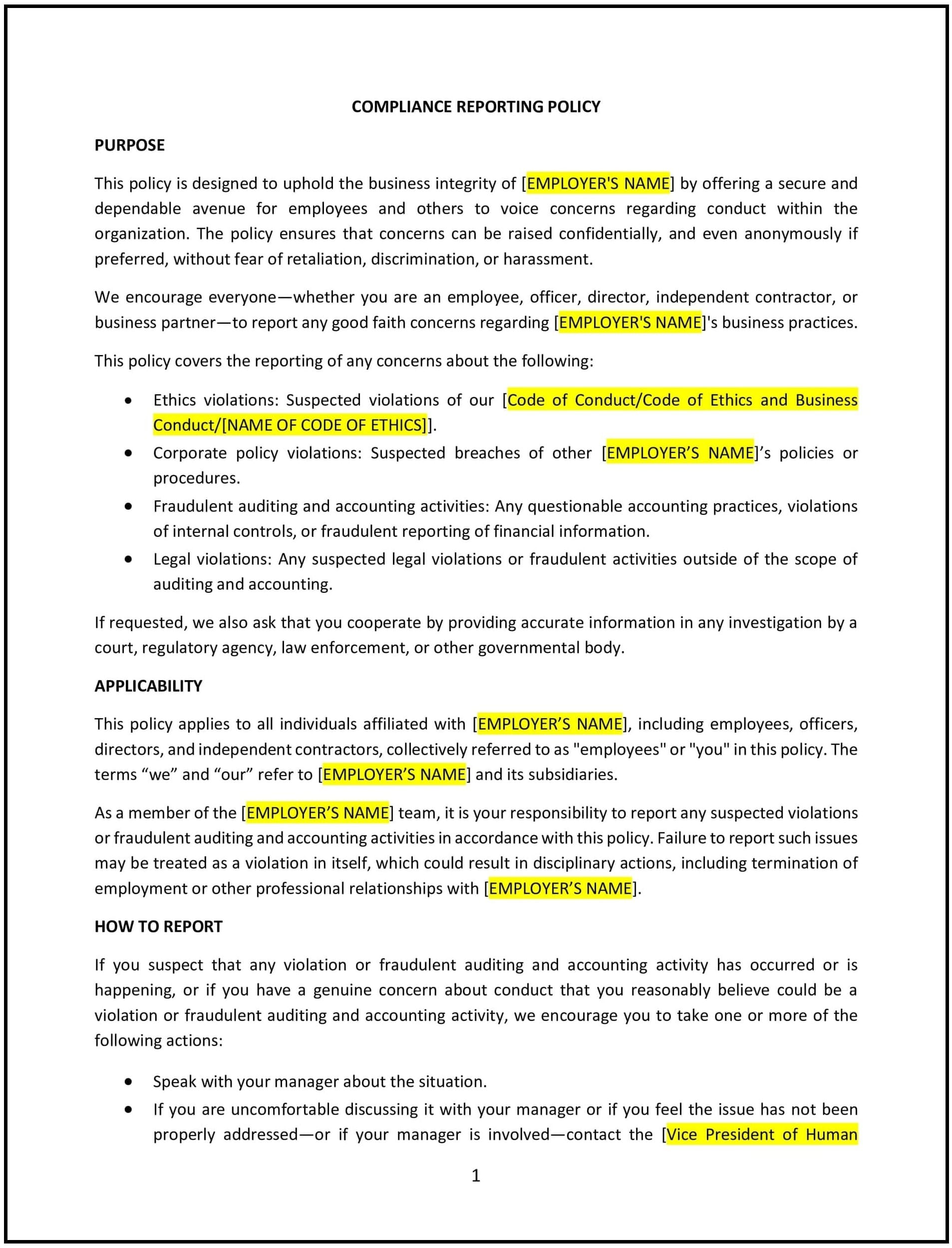Compliance reporting policy (West Virginia): Free template
Got contracts to review? While you're here for policies, let Cobrief make contract review effortless—start your free review now.

Customize this template for free
Compliance reporting policy (West Virginia)
A compliance reporting policy helps West Virginia businesses establish a clear framework for reporting potential violations of laws, regulations, and company policies. This policy ensures that employees understand how to report concerns about non-compliance, unethical behavior, or illegal activities within the company and outlines the steps to be taken to address these concerns confidentially and without fear of retaliation.
By implementing this policy, businesses can foster a culture of transparency, accountability, and ethical behavior while improving compliance with legal requirements and company standards.
How to use this compliance reporting policy (West Virginia)
- Define compliance violations: Clearly define what constitutes a compliance violation, such as breaches of company policies, local, state, or federal laws, ethical misconduct, fraud, or regulatory non-compliance.
- Establish reporting channels: Provide employees with clear, accessible reporting channels, such as a designated compliance officer, a hotline, an email address, or an external third-party service to ensure concerns can be raised easily and confidentially.
- Ensure confidentiality: Guarantee that reports of compliance violations will be handled confidentially, and that the identity of the person making the report will be protected to the extent possible.
- Prohibit retaliation: Clearly state that employees who report compliance violations will not face retaliation, discrimination, or negative consequences. Outline steps to protect whistleblowers and hold those who retaliate accountable.
- Set a process for investigation: Outline how reports will be investigated, including who will conduct the investigation, the timeline for completion, and the steps taken to resolve the issue.
- Define corrective actions: Specify the possible actions the company may take if a compliance violation is found, including disciplinary measures, corrective actions, or reporting to relevant authorities.
- Document the process: Keep records of all compliance reports, investigations, and actions taken to ensure accountability and continuous improvement of the compliance program.
Benefits of using this compliance reporting policy (West Virginia)
This policy offers several benefits for West Virginia businesses:
- Ensures legal compliance: A well-defined reporting policy helps the company stay compliant with state and federal laws, minimizing the risk of legal penalties or reputational damage.
- Fosters a culture of transparency: The policy encourages employees to speak up about unethical or illegal activities, contributing to a culture of honesty and integrity.
- Protects employees: By prohibiting retaliation and providing a confidential reporting process, the policy protects employees who report concerns from fear of negative consequences.
- Reduces risks: Early identification and resolution of compliance issues help mitigate risks, including financial losses, legal liabilities, and damage to the company’s reputation.
- Increases trust: Employees are more likely to trust the company and its leadership when they know there is a clear process for addressing compliance concerns fairly and transparently.
Tips for using this compliance reporting policy (West Virginia)
- Communicate the policy clearly: Ensure all employees are aware of the compliance reporting policy, how to use it, and the protection they are afforded when making a report.
- Train employees: Provide training on recognizing compliance violations, how to report them, and the importance of speaking up for the integrity of the organization.
- Monitor reports and responses: Regularly review compliance reports to identify patterns or recurring issues and ensure that reports are addressed promptly and effectively.
- Ensure fairness in investigations: Investigations should be impartial, thorough, and fair to all parties involved, ensuring the protection of the reporter’s rights while addressing any violations.
- Review the policy regularly: Periodically review and update the policy to ensure it remains aligned with current laws, industry standards, and company practices.